Three years after it went under contract, a standout building in Richmond’s Southside is in the hands of a new owner and headed for redevelopment with the closing of a multimillion-dollar deal.
The 15-acre Model Tobacco Co. complex at 1000 and 1100 Jefferson Davis Highway sold last week to Maryland-based developer C.A. Harrison Cos., which is planning to transform the site and redevelop its main Art Deco-style building into 275 income-based apartments.
The company paid just over $8.57 million in the June 10 sale. It had the property under contract since August 2017. The purchase was made through an entity called Model Tobacco Development Group LLC with a $6.5 million credit line deed of trust backed by Allegacy Federal Credit Union.
The seller was Charles Keck, who with his late wife Eileen had owned the former tobacco complex since the late 1980s. The property consists of three parcels and had an assessed value of over $5.66 million at the time of the sale.
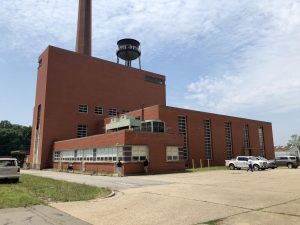
The Model Tobacco facility has been eyed for mixed-use redevelopment for decades. (BizSense file photo)
The transaction clears the way for the developer to pursue its plans for the property, which along with the apartments would be converted to include a 47,000-square-foot entertainment venue with a beer garden and restaurant space.
Principal Chris Harrison said construction on Model Tobacco should begin this fall, with a first phase estimated to cost about $59 million. He said that phase, which would bring 203 of the apartment units online, would involve the main building conversion, all site work, an event space, and amenities in the site’s former power plant building.
He said total buildout would take about 20 months. Richmond-based Walter Parks Architects is designing the project. A general contractor has not been selected.
“We have building permits and everything; we’re just waiting on one more piece of financing to free up,” Harrison said. “They kind of slowed things down once the pandemic started.”
Harrison said effects from the coronavirus pandemic also contributed to the time it took the transaction to finally close, tacking on another six months or so to an already years-long process.
“It was a difficult deal,” Harrison said, citing challenges in securing financing and the involvement of historic rehab tax credits. Andy Little with John B. Levy & Co. arranged the financing through Allegacy.
“We actually would have closed at the end of 2019, but then we ran into the Covid-19 issues,” Harrison said. “We’ve had all types of roadblocks that have presented themselves, but we stayed the course and got it done.”
Perseverance pays off
One South Commercial’s Ryan Rilee and Tom Rosman brokered the deal, putting a bookend on a listing that Rosman said he’s been working off and on since before the 2008 economic downturn.
“We stopped working on it and picked it up about four years ago,” Rosman said. “It’s been a long process but, the whole idea of perseverance: You’ve got to hang in there.”
Rosman noted the site’s proximity to Port City, developer Tom Wilkinson’s conversion of the former American Tobacco Co. complex into hundreds of income-based apartments. Harrison also mentioned that project as adding momentum to the area while his deal was in the works.
“I think it’s going to really be great for the city and for the neighborhood, once it finally gets developed,” Rosman said of Model Tobacco. “It’s going to be an iconic building, and it’s going to really be an up-and-coming area, just like Port City and Port City II have done.”
“We may have been a little bit ahead of the curve,” Harrison said, noting development interest in the area is just beginning to pick up. “Mr. Keck was extremely helpful and patient, especially with the pandemic, so we’re just pleased to be able to finally close with him and take ownership of the property.”
The project is the latest for Harrison in Richmond, where his other projects have included the 75-unit 2001 East Apartments at 2001 E. Broad St. and the 66-unit Argon Apartments renovation at 3805 Cutshaw Ave. Harrison later sold those properties for $9.6 million and $10.2 million, respectively.
“I hadn’t really had anything in the Richmond market since we sold the building at 2001 E. Broad, so to be back developing in Richmond is pretty exciting,” Harrison said.
Petersburg project in limbo
Beyond Richmond, Harrison’s holdings include the long-dormant Ramada Inn building in Petersburg, where a planned redevelopment has been stalled for years.
Complaints from the city, and lawsuits from contractors, have followed in years since, but Harrison said the project should not be considered dead.
“We’re working with economic development to get something announced this fall,” Harrison said, referring to the city department led by Carthan Currin, Petersburg’s economic development director. Reached Wednesday, Currin said he could not comment publicly on the project’s status at this time.
“We’re looking at a couple of concepts and seeing where hospitality is going to end up with this Covid-19,” Harrison said, adding that he couldn’t elaborate on plans. Announced in 2015, initial plans called for a hotel-anchored mixed-use development with apartments, retail and office space.
Interior demolition and asbestos remediation were conducted in recent years on the building, which looms beside Interstate 95 at the end of the Exit 52 off ramp. But work has notably stopped as the lawsuits played out, leaving the nine-story structure – highly visible along the interstate – resembling a gutted, bombed-out building.
In recent months, an undisclosed settlement was reached between Harrison and Richmond-based Commonwealth Architects, which sued the developer for upwards of $150,000 for services it said it was owed.
Another lawsuit was filed last month by Great American Insurance Co., a surety bondholder for the project, for nonperformance. Harrison said he expects that suit to be cleared up in an arbitration scheduled in August with E-Com LLC, a Midlothian-based engineering consulting firm that performed the demolition and remediation. E-Com said in its suit that it was owed the bulk of a $450,000 contract for that work.
“I don’t know if it’s even going to make it to the arbitration,” Harrison said. “We have a pretty clear case against them, but it has to go through the process.”
While the fate of the Petersburg project remains to be seen, Harrison pointed out differences between that project and Model Tobacco, which is to consist primarily of income-based apartments that Harrison described as workforce housing.
Harrison said that, given the times, commercial real estate development is riskier with projects such as hotels and new office space unless the developer is an end-user.
“Even retail is something that we would be cautious in building standalone,” he said. “But I think for multifamily, especially workforce housing, which is what we’re focused on at Model Tobacco, it’s sorely needed.”
Of the Model Tobacco complex now in his control, Harrison said, “It’s a big milestone, in terms of a step forward to getting the development done. But we’re not going to celebrate too much yet, because we still have to get the construction underway and get it built and up and operating.”
Three years after it went under contract, a standout building in Richmond’s Southside is in the hands of a new owner and headed for redevelopment with the closing of a multimillion-dollar deal.
The 15-acre Model Tobacco Co. complex at 1000 and 1100 Jefferson Davis Highway sold last week to Maryland-based developer C.A. Harrison Cos., which is planning to transform the site and redevelop its main Art Deco-style building into 275 income-based apartments.
The company paid just over $8.57 million in the June 10 sale. It had the property under contract since August 2017. The purchase was made through an entity called Model Tobacco Development Group LLC with a $6.5 million credit line deed of trust backed by Allegacy Federal Credit Union.
The seller was Charles Keck, who with his late wife Eileen had owned the former tobacco complex since the late 1980s. The property consists of three parcels and had an assessed value of over $5.66 million at the time of the sale.

The Model Tobacco facility has been eyed for mixed-use redevelopment for decades. (BizSense file photo)
The transaction clears the way for the developer to pursue its plans for the property, which along with the apartments would be converted to include a 47,000-square-foot entertainment venue with a beer garden and restaurant space.
Principal Chris Harrison said construction on Model Tobacco should begin this fall, with a first phase estimated to cost about $59 million. He said that phase, which would bring 203 of the apartment units online, would involve the main building conversion, all site work, an event space, and amenities in the site’s former power plant building.
He said total buildout would take about 20 months. Richmond-based Walter Parks Architects is designing the project. A general contractor has not been selected.
“We have building permits and everything; we’re just waiting on one more piece of financing to free up,” Harrison said. “They kind of slowed things down once the pandemic started.”
Harrison said effects from the coronavirus pandemic also contributed to the time it took the transaction to finally close, tacking on another six months or so to an already years-long process.
“It was a difficult deal,” Harrison said, citing challenges in securing financing and the involvement of historic rehab tax credits. Andy Little with John B. Levy & Co. arranged the financing through Allegacy.
“We actually would have closed at the end of 2019, but then we ran into the Covid-19 issues,” Harrison said. “We’ve had all types of roadblocks that have presented themselves, but we stayed the course and got it done.”
Perseverance pays off
One South Commercial’s Ryan Rilee and Tom Rosman brokered the deal, putting a bookend on a listing that Rosman said he’s been working off and on since before the 2008 economic downturn.
“We stopped working on it and picked it up about four years ago,” Rosman said. “It’s been a long process but, the whole idea of perseverance: You’ve got to hang in there.”
Rosman noted the site’s proximity to Port City, developer Tom Wilkinson’s conversion of the former American Tobacco Co. complex into hundreds of income-based apartments. Harrison also mentioned that project as adding momentum to the area while his deal was in the works.
“I think it’s going to really be great for the city and for the neighborhood, once it finally gets developed,” Rosman said of Model Tobacco. “It’s going to be an iconic building, and it’s going to really be an up-and-coming area, just like Port City and Port City II have done.”
“We may have been a little bit ahead of the curve,” Harrison said, noting development interest in the area is just beginning to pick up. “Mr. Keck was extremely helpful and patient, especially with the pandemic, so we’re just pleased to be able to finally close with him and take ownership of the property.”
The project is the latest for Harrison in Richmond, where his other projects have included the 75-unit 2001 East Apartments at 2001 E. Broad St. and the 66-unit Argon Apartments renovation at 3805 Cutshaw Ave. Harrison later sold those properties for $9.6 million and $10.2 million, respectively.
“I hadn’t really had anything in the Richmond market since we sold the building at 2001 E. Broad, so to be back developing in Richmond is pretty exciting,” Harrison said.
Petersburg project in limbo
Beyond Richmond, Harrison’s holdings include the long-dormant Ramada Inn building in Petersburg, where a planned redevelopment has been stalled for years.
Complaints from the city, and lawsuits from contractors, have followed in years since, but Harrison said the project should not be considered dead.
“We’re working with economic development to get something announced this fall,” Harrison said, referring to the city department led by Carthan Currin, Petersburg’s economic development director. Reached Wednesday, Currin said he could not comment publicly on the project’s status at this time.
“We’re looking at a couple of concepts and seeing where hospitality is going to end up with this Covid-19,” Harrison said, adding that he couldn’t elaborate on plans. Announced in 2015, initial plans called for a hotel-anchored mixed-use development with apartments, retail and office space.
Interior demolition and asbestos remediation were conducted in recent years on the building, which looms beside Interstate 95 at the end of the Exit 52 off ramp. But work has notably stopped as the lawsuits played out, leaving the nine-story structure – highly visible along the interstate – resembling a gutted, bombed-out building.
In recent months, an undisclosed settlement was reached between Harrison and Richmond-based Commonwealth Architects, which sued the developer for upwards of $150,000 for services it said it was owed.
Another lawsuit was filed last month by Great American Insurance Co., a surety bondholder for the project, for nonperformance. Harrison said he expects that suit to be cleared up in an arbitration scheduled in August with E-Com LLC, a Midlothian-based engineering consulting firm that performed the demolition and remediation. E-Com said in its suit that it was owed the bulk of a $450,000 contract for that work.
“I don’t know if it’s even going to make it to the arbitration,” Harrison said. “We have a pretty clear case against them, but it has to go through the process.”
While the fate of the Petersburg project remains to be seen, Harrison pointed out differences between that project and Model Tobacco, which is to consist primarily of income-based apartments that Harrison described as workforce housing.
Harrison said that, given the times, commercial real estate development is riskier with projects such as hotels and new office space unless the developer is an end-user.
“Even retail is something that we would be cautious in building standalone,” he said. “But I think for multifamily, especially workforce housing, which is what we’re focused on at Model Tobacco, it’s sorely needed.”
Of the Model Tobacco complex now in his control, Harrison said, “It’s a big milestone, in terms of a step forward to getting the development done. But we’re not going to celebrate too much yet, because we still have to get the construction underway and get it built and up and operating.”

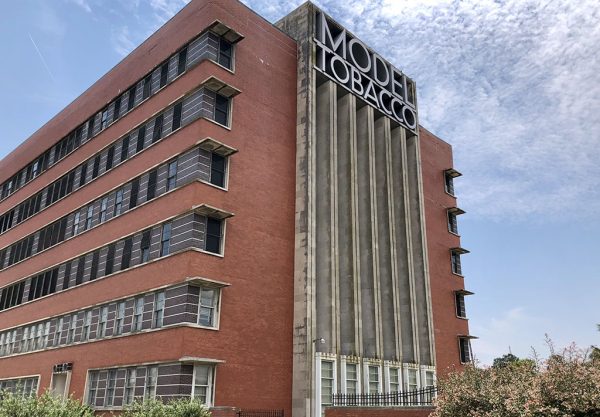
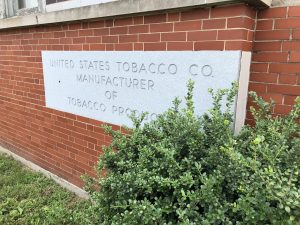
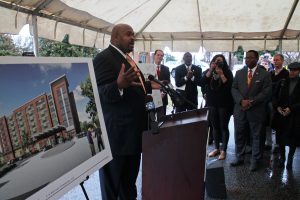
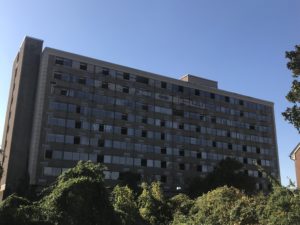


” . . . a first phase estimated to cost about $59 million. He said that phase, which would bring 203 of the apartment units online . . . .” That’s about $300,000 per “income based” apartment. Do the folks in Planning own a calculator?
There are likely a lot of front end expenses such as new amenities and whole property remediation that will not be necessary for the remaining units.
This is a gorgeous building and the repurposing of it is especially significant because it turns the corner so to speak, bringing capital further south in that corridor.
Come on he also said he “ha(s)ve building permits and everything; we’re just waiting on one more piece of financing to free up.” I checked the permits system. A building and mechanical permits were filed Dec 2019 on 1100 JD building (no recent permits at 1000 address) and those permits expired last week as they had no inspections for work in 6 months. So legal he does not have any active building or trade permits. They do have several approved plans for the site and DHR consultation noted. But Petersburg got so far as demo and abatement then died. I… Read more »
Harrison may be referring to tax credit awards. Preliminary notification is announced the first week in June but it’s not official quite yet. As well, a little thing called COVID-19 has disrupted the annual process at VHDA.The expired permits can be reactivated without much stress.
Congratulations to Andy Little with John B. Levy & Company for arranging the financing with Allegacy!